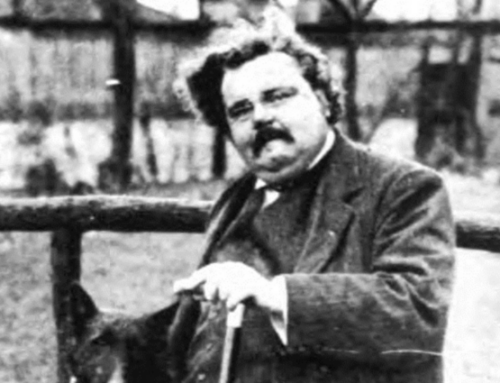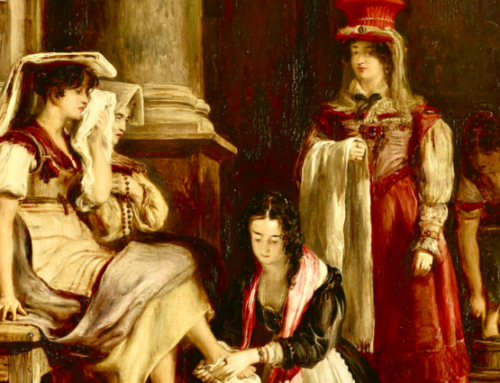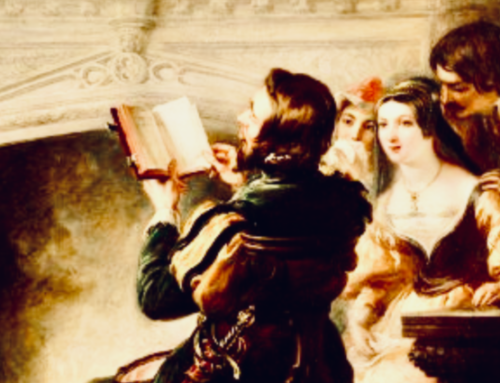Chesterton once observed of his perennial sparring partner, George Bernard Shaw, that he would need to live for 300 years to finally be able to accept Catholic faith. Might we apply that same rule to the late controversialist Christopher Hitchens?
A prolific writer of twelve books and five collections of essays, and a staple in such publications as The New Statesman, The Atlantic, Vanity Fair, The Nation, and any magazine that wanted an elegant display of rhetorical fireworks, Hitchens came across my radar screen in the late 1990’s as one of those man-bites-dog stories to which the only response is to pat the man on the head and say, “Good boy.” A committed socialist and left-winger, he was vociferous in his condemnation of President Clinton’s behavior, even contributing an affidavit for the Republican-led impeachment of that president.
But “the enemy of my enemy” only takes one so far, and the next impression I had was during coverage of the funeral of Mother Teresa. I was stunned to see Hitchens introduced to the desk by Dan Rather, or whichever network talking head was officiating. Hitchens had authored a 1995 screed, The Missionary Position: Mother Teresa in Theory and Practice, which put Mother Teresa in the dock for her failure to do the real charitable work of socialist agitation and for her awful Catholic teachings about contraception and abortion which apparently caused Third World poverty. That poor foolish woman, Hitchens did not say, merely fed the poor, clothed the naked, and tended to the sick, dying, and unwanted.
Hitchens became increasingly well-known in the United States over the next decade because of his changing political views (his support of the U. S.-led wars in Afghanistan and Iraq were accompanied by a general shifting from some sort of Trotskyism to something occasionally approximating neo-conservative views) and the origins of his Mother Teresa-hatred, namely his “antitheism.” On neither politics nor religion did I find Hitchens interesting or enlightening. Over the same years, however, I began to read Hitchens’s more congenial literary work. His taste was, as David Pryce-Jones noted, “oddly conventional” and gravitated to authors like Waugh, Anthony Powell, Philip Larkin, and Wodehouse. His last published essay, about which more later, was an attempt to engage with Chesterton.
Hitchens was the son of Eric, an English naval commander, and Yvonne Jean Hickman, a “Wren” (member of the Women’s Royal Navy Service), who had met in Scotland and soon married. The Hitchens family moved around quite a bit during Christopher’s early years. His younger brother, Peter, a writer in his own right who is an Anglican Christian, was born in Malta. Hitchens’s mother, twelve years younger than his father, was quoted by Hitchens in his memoir, Hitch-22, as saying that if there were to be an English upper class, her son would be in it. Hitchens was thus sent off to various boarding schools and eventually Balliol College where he studied philosophy, politics, and economics. It being the late sixties, Hitchens had the opportunity to attend numerous demonstrations of one sort or another and managed to pick up the Marxism he would carry with him for another thirty years. As a number of people have noted, the fierce tribal disputes among the various minuscule left-wing groups at Oxford did not keep Hitchens from mixing with anybody who might help him in his own rise. His mother had faithfully imbued her own belief in her son’s destiny to be in the upper class, his own Marxist egalitarianism notwithstanding. As Joseph Epstein once noted of socialists, they never fail to have the best seats at the opera.
His mother’s other legacy was to be more tragic. In 1973 she left Eric and fled to Israel during the Yom Kippur War with her lover, the Reverend Timothy Bryan. She died en route to Israel in Athens, presumably murdered, but eventually it came out that she and Bryan had made a suicide pact. Hitchens discovered many years later the secret his mother had kept from the whole family: she had been Jewish herself. This led to various journeys of discovery of his mother’s family history in Eastern Europe. It perhaps also led to a softening of his native left-wing bias against the state of Israel.
In the 1970’s, however, Hitch remained attached to Trotsky and all his pomps and splendors. His hip, left-wing literary circle included Martin Amis, Salman Rushdie, James Fenton, and Edward Said. The circle did not remain unbroken as Hitchens, whose wanderlust took him to every exciting place on the globe (his physical courage while in danger, his incessant smoking, high-functioning alcoholism, and polished rhetoric in the cause of shocking all, remind one of Evelyn Waugh), began to discover that all that glitters in socialist eyes is not gold. He ended up siding with Margaret Thatcher over the Falklands War. While Said defended the Iranian Revolution, Hitch castigated the Ayatollah and became known for his free speech absolutism as well as his opposition to Islam and every sort of religion not involving Marx.
His first marriage, in the Greek Orthodox Church of all places, ended, and he remarried an American named Carol Blue in the 1980’s. He also relocated to America, further testing the resolve of his Marxism. Well, he sort of moved to America, relocating from one small island to another (Manhattan) where he again proved his ability to charm his way to all the right people, most of whom happened to be left-wing antitheists of one shade or another. Gore Vidal, Susan Sontag, Norman Mailer—all the people (David Pryce-Jones again) who were “experts at undermining the privileges on which they have depended for their careers”—were “friends.” Yet Hitchens did have a certain moral cast of mind that allowed him to continue his journey of re-discovery of the horrors of most of the political and military figures who claimed his own leftism. Aside from his Mother Teresian ravings and his help in the Clinton impeachments, he was notable for his moral stands against the ethnic cleansing efforts that pop up with alarming frequency in this age of “progress.” He hated tyranny and defended any effort against it, not always maintaining his sympathies with these efforts, as so many of them led to further tyranny on the part of the other side. And, as another more thoroughly converted former leftist, Peter Collier, put it, “Hitch” (as he became known) never acknowledged that he had really done anything more than make “a midcourse steering correction,” always making clear that “no accounting for past commitments would be required of him.”
That inability to even have “a dark night of the soul” was not just a political fact; it was constantly on display in his irritatingly incoherent anti-theism. David Bentley Hart, the author of The Atheist Delusion, observed in an essay about what he had learned from the “new atheists” (answer: almost nothing), that while none of them could really string together a coherent argument, Hitchens was perhaps the worst, even if the “most entertaining.” The famous rage against the evils done in God’s name might have been more effective if almost all the details hadn’t been wrong, but the formal irrationality of Hitch’s “argument” outstrips even the falsity of his facts.
As best I can tell, Hitchens’ case against faith consists mostly in a series of anecdotal enthymemes—that is to say, syllogisms of which one premise has been suppressed. Unfortunately, in each case it turns out to be the major premise that is missing, so it is hard to guess what links the minor premise to the conclusion. One need only attempt to write out some of his arguments in traditional syllogistic style to see the difficulty:
Major Premise: [omitted]
Minor Premise: Evelyn Waugh was always something of a bastard, and his Catholic chauvinism often made him even worse.
Conclusion: “Religion” is evil.
Or:
Major Premise: [omitted]
Minor Premise: There are many bad men who are Buddhists.
Conclusion: All religious claims are false.
Or:
Major Premise: [omitted]
Minor Premise: Timothy Dwight opposed
smallpox vaccinations.Conclusion: There is no God.
The sheer charm of Hitch, however, made him something of a darling of religious believers of all stripes, many of whom seemed to believe he was on the verge of some sort of conversion experience. After all, the argument goes, indifference, not hate, is the opposite of love. Hitch was never indifferent to God. Therefore, he was on the brink of love and it is likely that he could have had a deathbed conversion when all was still in his soul.
Perhaps. But, humanly speaking, this was very unlikely. We do know that he was wrestling with something in his last days as he observed in himself less hatred when told that people were praying for him. But that final essay on Chesterton gives more evidence that, like Shaw, he would have needed a few hundred more years to get there. The essay on Ian Ker’s biography of Chesterton was nothing if not a continuation of Hitch’s inability to get historical facts right and actually argue against a strong position, rather than dance around it with words. In that essay Hitchens applauds Chesterton’s nonsense verse as the greatest thing about him, yet ignores the very heart of Chesterton’s work as both a literary critic and religious philosopher. Charles Dickens? Orthodoxy? The Everlasting Man? Never heard of ‘em.
And while, surprisingly, Hitchens judges Chesterton to be a “Christian Zionist” rather than an antisemite, he nevertheless resorts to the argumentum ad Hitlerum and a healthy dollop of the stale “secularization thesis” that as modernity progresses religious belief will simply slip away as unneeded. Chesterton was a Catholic, the Vatican made a concordat with Germany in 1933, therefore any verbal opposition to the Nazis was belied by his supporting Hitler’s Pope. Or something. In any case, as he tells us, religion is old-fashioned and doesn’t even need to be answered rationally. So there.
Perhaps those clever literary essays will pass the test of time, much as Shaw’s plays have. But it’s unlikely that much else of his writing will. What was interesting about Hitchens was the persona he created for himself, not the thin, preposterous ideas or policies he propounded. Chesterton was once asked at a conference in Canada whether the “coming peril” was Bernard Shaw. Chesterton responded that he was neither; rather, he was a “passing pleasure.” This, too, sums up Hitchens.
This essay originally appeared in Gilbert 16:1-2 (September-October 2012): 22-3.
The Imaginative Conservative applies the principle of appreciation to the discussion of culture and politics—we approach dialogue with magnanimity rather than with mere civility. Will you help us remain a refreshing oasis in the increasingly contentious arena of modern discourse? Please consider donating now.
The featured image, uploaded by Ari Armstrong, is a photograph of Christopher Hitchens as the featured speaker for the June 25, 2005 Alcohol, Tobacco, and Firearms Party hosted by the Independence Institute in Colorado. This file is licensed under the Creative Commons Attribution-Share Alike 3.0 Unported license, courtesy of Wikimedia Commons.








If Hitchens lived 10,000 years, he never would have become a religious man. I also thought he was somewhat overrated as a writer. He certainly had talent, but he was nowhere near the master of the English language that so many people were claiming when he died.
100 years from now, we’ll still be quoting Chesterton. Hitchens will be all but forgotten. The atheist’s Chesterton, he was not. Let us hope he found redemption on his death bed, and that his soul is at rest in peace.
Hitchens’ primary complaint against Mother Teresa was that the “care” she provided did not extend to providing painkillers, on the grounds that suffering was “the kiss of Christ”.
It’s a shame that the author zeros in on Mr. Hitchens atheism / anti-theism but skips over the part of Mr. Hitchens work that made me forever a fan: his staunch defense of free speech. Granted this is more evident in his speeches and debates on the subject rather than his writings, but I have rarely heard / read more cogent, logical, witty, or eloquent defenses of free speech than his. If for no other reason, this would have driven him from todays left.
It’s very sad that free speech has become so controversial, and that makes Christopher Hitchens more prescient than most about its importance and the need to vociferously defend it.
What I’ve been telling people lately is that when censorship happens, the censorship is the issue, and the only issue, until the censorship stops.
Blogger Orrin Judd used to express his opinion the Mr. Hitchens might convert to Christianity, but that it would require a personal invitation from the Pope.